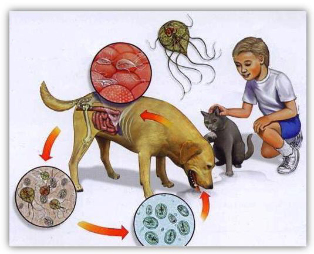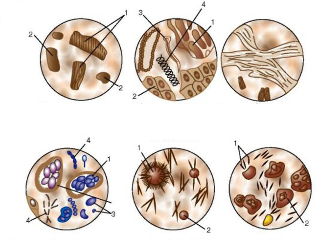Parasites are microorganisms that survive by feeding on their hosts. It causes serious health problems while living in the human body and can be fatal as a result of proliferation.
Parasitic organisms are generally divided into two types:
- Parasitic worms (helminths, flatworms), arachnids, ticks, mollusks, etc. incoming zooparasites.
- Phytoparasites are parasitic plants, viruses, pathogenic fungi, etc.
In addition, some types of viruses that lead a parasitic lifestyle at the expense of a foreign organism can be classified as parasites.
Unfortunately, modern society is not completely immune to such parasites, but if you do a timely analysis for parasites, you can get rid of them without causing serious damage to their health.
Symptoms of parasites in the human body
Parasites enter the human body through natural openings such as the mouth, genitals and anus. Less often, helminths penetrate the skin, genitourinary system or ears.
The causative agents of the disease can be transmitted through food and water (most worms), contact with an infected person (pinworms), soil, air or dust (roundworms).
Often invasive diseases are asymptomatic and do not show their presence to me in any way. However, with overpopulation, there are usually signs of various diseases that do not indicate the presence of parasites, which significantly complicates treatment due to the inability to correctly diagnose.
However, there are a number of signs to think about the presence of parasites in the human body.
These include:
- frequent headaches;
- regular joint pain;
- unreasonable muscle pain;
- frequent colds;
- allergic skin rashes;
- difficult bowel movements and constipation;
- teething during sleep;
- low efficiency, constant fatigue;
- increasing nervousness;
- insomnia;
- cracked heels;
- shortness of breath;
- digestive system disorders;
- sharp fluctuations in weight;
- fragility of nail plates;
- Itching in the anus.
Tumor neoplasms
It should be borne in mind that parasitic diseases can cause serious problems. For example, a large number of helminths can coalesce and cause intestinal obstruction.
Parasites can also cause chronic cell damage, cancer, anemia, or jaundice.
Symptoms of parasites in children

Symptoms of parasitic organisms in a child:
- violation of the usual diet (loss of appetite, satiety);
- increase in body temperature;
- allergic rash;
- enthusiasm, weakness, nervousness;
- dark circles under the eyes;
- pale skin;
- intestinal problems (diarrhea with mucus or constipation);
- Nausea and vomiting mostly in the morning.
Most parasites cannot leave the human body on their own. Therefore, if at least one of the above symptoms occurs, it is important to contact a local therapist or pediatrician, get tested for parasites and receive treatment for helminths.
Diagnosis of invasive diseases
Diagnosis of invasive diseases involves the detection of parasites (pinworms, amoebas) and their reproductive products (larvae, eggs). A blood test, stool, tissue rupture, or sputum test is pre-arranged. To learn examples, do the following:
- histological examinations;
- immunological studies;
- blood macroscopy;
- vegetative resonance tests.
Parasite presence tests in children

Before consulting a specialist, parents often think about what tests should be done to identify parasites in a child and which method will give more accurate results. Analysis of invasive diseases in children is determined by the location and type of parasites.
Most defined:
- Blood test with ELISA;
- serological test;
- PCR fracture or stain;
- Blood test in adults and children.
The blood test is the most effective type of research and allows you to determine the exact picture of the disease, the type of helminth, as well as its ability to reproduce. Allows to determine the presence of ascariasis, toxoplasmosis, cysticercosis, amoebae and lichens.
One type of such study is the ELISA blood test, which allows you to assess the content of certain antibodies in plasma, determine the stage of infection, study the body's immune response to helminths and identify specific elements in the blood.
Advantages of ELISA research:
- accuracy of the result, regardless of the specialty and experience of the laboratory assistant;
- high sensitivity of the analysis, up to 90% accuracy;
- allows you to show a complete picture of the disease and the number of parasites;
- parasites are diagnosed at an early stage of development;
- ability to monitor the dynamics of the disease;
- Determination of the presence of toxic products in the blood.
When interpreting the result, the color of the reagent and the intensity of the shadow of the sample are taken into account. The ratio of antibodies to parasitic antigens is measured by the level of IgM and IgG markers in the blood. High IgM and IgG concentrations are maintained throughout the life of the helminths.
If the blood test shows high levels of IgM, the disease is acute. IgG antibodies speak of a chronic form of the disease.
Disadvantages of blood tests for the diagnosis of parasitic diseases:
- Blood test results with ELISA are obtained within 7 days, shaving, staining and fecal samples are obtained after 1-2 days;
- research must be done for a fee in a special laboratory.
It is recommended to give blood on an empty stomach in the first half of the day, it is recommended not to take the drug 12-15 hours before blood collection. Parents are advised to prepare their children in advance.
Fecal Analysis

Traditional determination of helminths may require microscopic analysis of feces. During the examination, it is determined that a part of the feces contains a parasitic egg.
The most accurate result is the result of 3 tests per week.
For the most accurate result, a piece of stool should be sent to the laboratory for examination no later than 45 minutes after bowel movements.
Parasites during research are as follows:
- created a ribbon;
- topics;
- round helminths.
This type of diagnostics is so easy that you can't claim to be 100% accurate. This is because the parasites that live in the human body do not lay eggs for a long time.



























